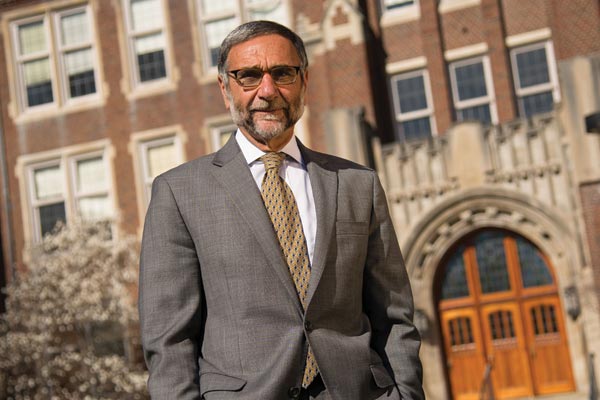Heritage
A Decade of Changes
Daan Braveman reflects on 10 years as Nazareth’s president
by Erich Van Dussen
In autumn 2012, as Nazareth College prepared for the long-awaited opening of Peckham Hall, President Daan Braveman was reminded by William Lammela, Ph.D., chair of the chemistry department, about just how long the wait had actually been. “Bill told me that when he first came here—30 years ago—they were already talking about plans to get a new math and science building.
“So that took a while,” Braveman recalls. “But now it’s a wonderful addition to the campus.”
Indeed, the last 10 years have seen many substantial additions to the Nazareth landscape besides Peckham Hall—including a completed Golisano Academic Center, a renovated Arts Center and, coming this fall, a state-of-the-art Wellness and Rehabilitation Institute. As Braveman considers the College’s evolution since he took office in 2005, he calls these new buildings “only the most obvious changes” to have occurred during Nazareth’s last decade.
“It’s all about supporting the teaching and learning experience, with facilities as well as programs,” he says, noting in particular the “tremendous growth” in the School of Health and Human Services, as well as dozens of new academic initiatives designed to help students explore pathways of educational opportunity.
Nazareth’s single most influential programmatic change of the last decade, he adds, was the adoption of a new core curriculum in 2013. “That was so important,” Braveman says. “Everybody has to take it, no matter what they’re studying. And it’s not just taking big courses, but also looking at big questions, and exploring how they integrate into your work.”
New emphases on international studies, civic engagement, and diversity have all contributed to a redefinition of a Nazareth education.
“We like to say we’re not just preparing students for making a living; we’re preparing them for making a life,” Braveman says. “Getting students involved in their communities, engaging with people who are different from them and thinking about the world around them … helps them learn to become better citizens of whatever communities they choose to live in, after they leave here.”
Meeting unexpected challenges
Braveman took office in 2005 with an awareness of key areas that would need to be addressed in the years to come. But if part of being a good leader rests in the ability to adapt to surprises, one such test of leadership was just around the corner.
“We did not see the recession of 2007 and 2008 coming, and we certainly couldn’t have predicted its lasting impact,” he says. “Even though the economy is better now, it’s forced us to change the way we think about financing education.”
Cutting expenses in a number of areas helped reduce the school’s reliance on tuition increases. “It was difficult, but it’s helping us keep the cost of going to Nazareth accessible to as many students as possible.”
During this same period, one potential source of increased revenue—simply admitting more students—became less of an option as high school graduation rates began to decline throughout the Northeast, and as fewer college graduates were pursuing advanced degrees.
“Although we cut some expenses in order to keep down the costs for our students, we have not lost the important focus on small classes taught by faculty members. Our student-to-faculty ratio remains very low, which adds to the value of a Nazareth education: Students are in small classes, being taught by faculty members, not teaching assistants.”
Next steps
To date, two consecutive strategic plans have been developed during Braveman’s tenure; the current plan helps chart a direction for the college through 2020. The fact that these formal plans exist at all is yet another example of the strides made at Nazareth over the last decade; most importantly, however, they reflect an emphasis on looking forward, not back.
“What should we do next?” Braveman asks. “We need to remain focused on everything we’ve been doing, in terms of improving access to education, and doing all we can to maximize the educational experience our students have while they’re here.”
One of the most exciting developments in the planning phase is the establishment of the Center for Career and Professional Development. “This center would bring together all we do to prepare students for making a career and a meaningful life,” says Braveman. “The idea is to provide a bridge that connects the curriculum, student services, internships, research opportunities, and other experiences related to the career and professional development goals of our students.”
Braveman would like to see more innovative uses for technology to expand students’ exposure to different ideas—even those that may not technically come from Nazareth. “We’re in a consortium called New American Colleges & Universities—it’s 23 liberal arts schools from Staten Island to California. Together, we set up a catalog of 300 online courses that any student from any of our schools could take. It’s an exciting program that hasn't come close to realizing its full potential.”
Even after 10 years he says he doesn’t give much thought to the idea of a legacy. “I don’t focus on thoughts about personal legacy. The achievements during the past decade are the result of hard work by many, many people.” But that doesn’t preclude Braveman from citing his proudest ongoing achievement.
“When I ask students what they like best about Nazareth, they all say the same thing: The faculty and staff’s commitment to their success. When I shake the hands of students as they walk across the stage [at graduation], I’m confident that we have given the students the best educational experience.
“That, to me, is the biggest single thing we can do,” he adds. “It is why we are here.”
Erich Van Dussen is a freelance writer in Rochester, New York.

President Braveman's Vision
More about Daan
See his bio, his team, and a video about his favorite teacher and about hearing Rev. Martin Luther King Jr. speak. President's office »